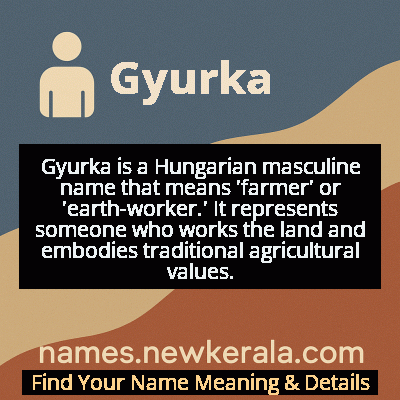Gyurka Name Meaning & Details
Origin, Popularity, Numerology Analysis & Name Meaning of Gyurka
Discover the origin, meaning, and cultural significance of the name GYURKA. Delve into its historical roots and explore the lasting impact it has had on communities and traditions.
Name
Gyurka
Gender
Male
Origin
Hungarian
Lucky Number
2
Meaning of the Name - Gyurka
Gyurka is a Hungarian masculine name that means 'farmer' or 'earth-worker.' It represents someone who works the land and embodies traditional agricultural values.
Gyurka - Complete Numerology Analysis
Your Numerology Number
Based on Pythagorean Numerology System
Ruling Planet
Moon
Positive Nature
Diplomatic, friendly, artistic, empathetic.
Negative Traits
Over-sensitive, moody, indecisive, prone to self-pity.
Lucky Colours
Green, cream, white.
Lucky Days
Monday.
Lucky Stones
Pearl, moonstone.
Harmony Numbers
1, 3, 4.
Best Suited Professions
Diplomats, mediators, caregivers, artists.
What People Like About You
Cooperative spirit, friendliness, artistic talent.
Famous People Named Gyurka
Gyurka Bíró
Military Commander
Led successful defenses against Ottoman invasions in Transylvania
Gyurka Báthory
Nobleman
Member of the influential Báthory family, known for his patronage of arts and education
Gyurka Bognár
Folk Musician
Preserved traditional Hungarian folk music and instruments
Gyurka Kovács
Agricultural Innovator
Developed improved farming techniques for Hungarian plains
Name Variations & International Equivalents
Click on blue names to explore their detailed meanings. Gray names with will be available soon.
Cultural & Historical Significance
The name also appears frequently in Hungarian folk tales and songs, often representing the archetypal Hungarian peasant - resilient, practical, and deeply connected to the natural world. In traditional Hungarian naming customs, Gyurka was often given to honor Saint George, the patron saint of several Hungarian towns and a symbol of military strength and agricultural protection. The name's persistence in Hungarian culture reflects the enduring importance of agricultural traditions and rural values in the national identity, serving as a linguistic bridge between modern Hungarians and their ancestral connections to the land.
Extended Personality Analysis
Individuals named Gyurka are typically perceived as grounded, practical, and hardworking, reflecting the name's agricultural origins. They often exhibit strong connections to tradition and family, valuing stability and consistency in their lives. These individuals tend to be reliable and methodical in their approach to problems, preferring practical solutions over theoretical ones. Their connection to the name's farming heritage often translates into a patient, nurturing personality with a strong sense of responsibility toward those in their care.
Gyurkas are generally seen as having a quiet strength and resilience, able to endure challenges with determination and perseverance. They often possess a deep appreciation for nature and simple pleasures, and while they may not be the most flamboyant or outgoing individuals, they form deep, lasting relationships built on trust and mutual respect. Their practical wisdom and steady demeanor make them valued members of their communities, often serving as stabilizing influences during times of change or uncertainty. The name suggests someone who builds their life gradually and carefully, much like a farmer tending crops through seasons.
Modern Usage & Popularity
In contemporary Hungary, Gyurka has become increasingly rare as a given name, though it remains popular as a nickname or affectionate form for individuals named György. The name experienced its peak popularity in the late 19th and early 20th centuries, particularly in rural areas, but has declined significantly since the mid-20th century due to urbanization and changing naming trends. Today, it is occasionally used by parents seeking to honor family traditions or embrace historic Hungarian names, but it ranks outside the top 500 most popular male names in Hungary. The name maintains stronger presence among Hungarian diaspora communities, where it serves as a cultural identifier and connection to Hungarian heritage. Modern usage often carries a nostalgic or traditional connotation, appealing to families with strong ties to Hungarian rural traditions or those seeking to preserve cultural heritage in an increasingly globalized world.
Symbolic & Spiritual Meanings
Gyurka symbolizes the enduring connection between humanity and the earth, representing fertility, growth, and the cyclical nature of life. The name carries metaphorical meanings of cultivation - not just of land, but of relationships, knowledge, and personal character. It embodies the virtues of patience, as farming requires waiting for seeds to grow, and resilience, as crops must weather storms and droughts. Symbolically, Gyurka represents the idea that through consistent, dedicated work, one can transform raw potential into abundant harvests. The name also signifies rootedness and stability, much like a well-tended field that remains productive through generations. In a broader sense, it serves as a reminder of our dependence on the natural world and the importance of living in harmony with the rhythms of nature, while also representing the Hungarian cultural values of perseverance, practicality, and connection to ancestral lands.

